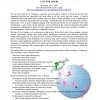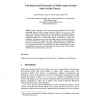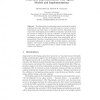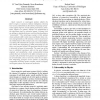126
click to vote
MMAS
2004
Springer
15 years 8 months ago
2004
Springer
d to submit first an abstract (to signal your interest and contribution) and then a full paper (for review) to the workshop. All accepted papers will be published as a volume from ...
120
Voted
IBERAMIA
2004
Springer
15 years 8 months ago
2004
Springer
Many approaches of the agent paradigm emphasize the social and intentional features of their systems, what are called social properties. The study of these aspects demands their ow...
117
Voted
ESAW
2004
Springer
15 years 8 months ago
2004
Springer
We believe that successful co-operation between multi-agent systems providing services in a specific domain can be realized by constructing an infrastructure that supports the sem...
94
Voted
ESAW
2004
Springer
15 years 8 months ago
2004
Springer
The deployment of multi-agent systems demands for justified confidence into their behaviour, both with respect to correct results of computations and with respect to timeliness t...
113
click to vote
ER
2004
Springer
15 years 8 months ago
2004
Springer
Social and intentional behaviours appear as two main components of the agent paradigm. Methods of conventional software engineering do not seem to be appropriate to gain a full kno...
145
click to vote
DALT
2004
Springer
15 years 8 months ago
2004
Springer
The concept of a social norm is used in multi-agent systems to specify behaviours required of agents interacting in a given social context. We describe a method for specifying soci...
120
click to vote
ATAL
2004
Springer
15 years 8 months ago
2004
Springer
Much research in multi-agent systems reflects the field’s origins in classical artificial intelligence, showing how various refinements to the internal reasoning of individual a...
107
Voted
ATAL
2004
Springer
15 years 8 months ago
2004
Springer
In an open system, multi-agent computations must compete for resources required for satisfying their goals. We describe CyberOrgs, a hierarchical model for acquisition and control...
117
click to vote
ATAL
2004
Springer
15 years 8 months ago
2004
Springer
As the science of multi-agent systems matures, many developers are looking to deploy mission critical applications on distributed multi-agent systems (DMAS). Due to their distribu...
113
Voted
ATAL
2004
Springer
15 years 8 months ago
2004
Springer
Single-agent reinforcement learners in time-extended domains and multi-agent systems share a common dilemma known as the credit assignment problem. Multi-agent systems have the st...





